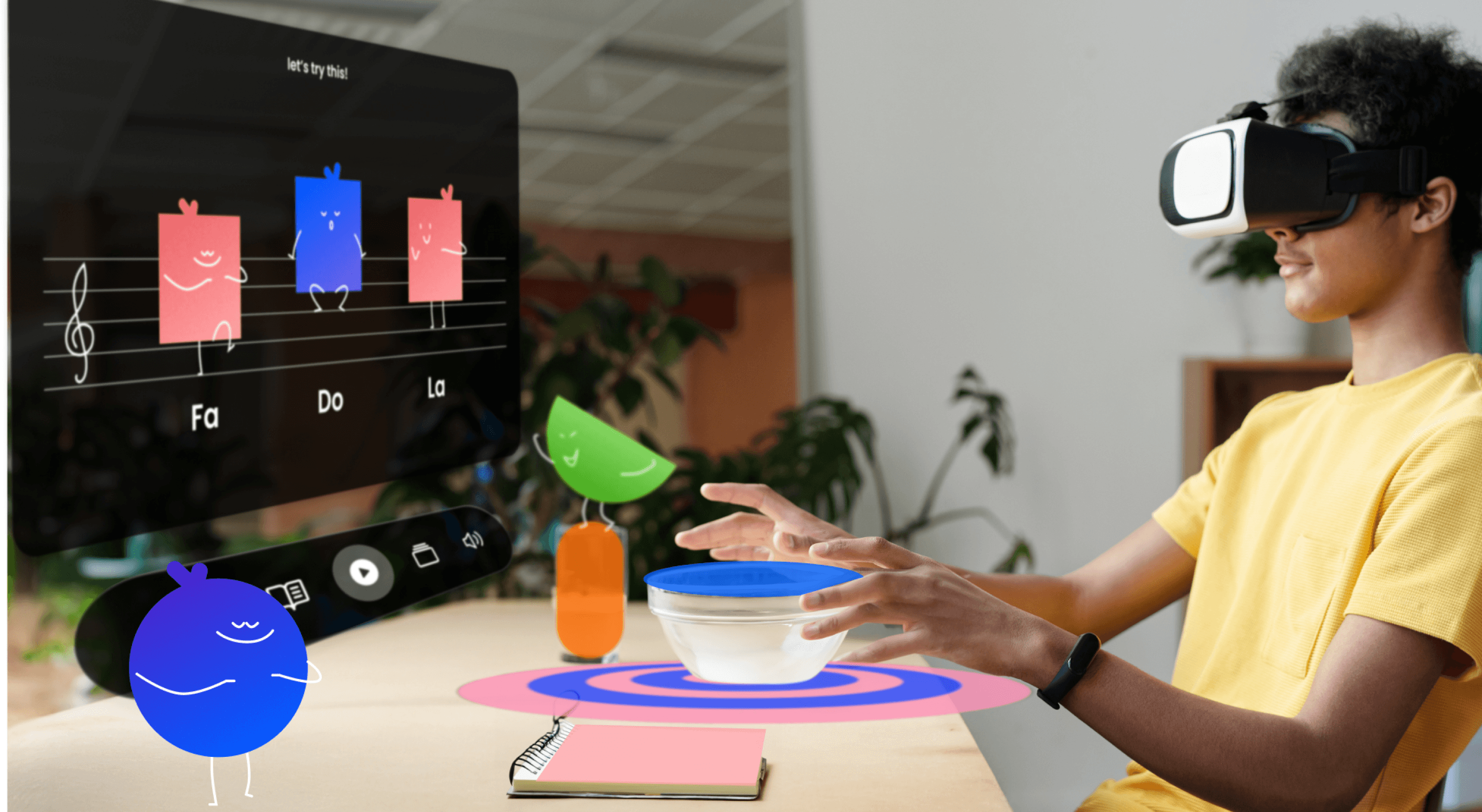

Muso
Muso is a XR creative music synthesizer that can turn daily objects into instruments in MR
MUSO is an XR music synthesizer that encourages children to turn ordinary everyday objects into fascinating musical instruments in XR. That feeling captures the essence of childhood wonder and the limitless potential of the imagination.
MUSO offers users such a musical journey while introducing them to the basics of music theory.
MUSO believes that music learning should be easy and fun, and hopes to bridge the gap in children's music education through a low-cost, entertaining approach.
About Project
RECOGNITION & AWARDS





DURATION: Jan 2023 - Apr 2023
MY CONTRIBUTION: UI Design, Interaction Design, XR Prototype, User Testing
OTHER CONTRIBUTOR: Monica Zhang, Zoe Zhang
TOOLS USED: Unity, Figma, Adobe Suits, Visual Studio Code, C Sharp
MUSO believes that music learning shouldn't be boring and inaccessible, by blending education with imagination and creativity, bridging the gap with affordable, engaging method. We aim to tackle <10% access to music education in the developing world.
The Core Idea
According to the statistics of 2022,
the popularization rate of music education in developing countries is less than 10%.
In China, for example, there is a general lack of music education for children due to factors such as the cost of music learning, the level of teachers, and the lack of widespread popularization and use of professional, effective, and fun children's music pedagogies for music initiation.
What do Chinese young people think of when it comes to musical initiation?
Learning to play the piano or the violin, which in turn conjures up images of children crying by the side of their instruments.
The Key Problem &
User Group
Click here for more information
MUSO is an XR music synthesizer that empowers kids to explore music by transforming surrounding everyday objects into magical instruments. Teaching knowledge while kids play in XR.
Then, what is MUSO?
Key features of MUSO
Development Challenges
How it works?
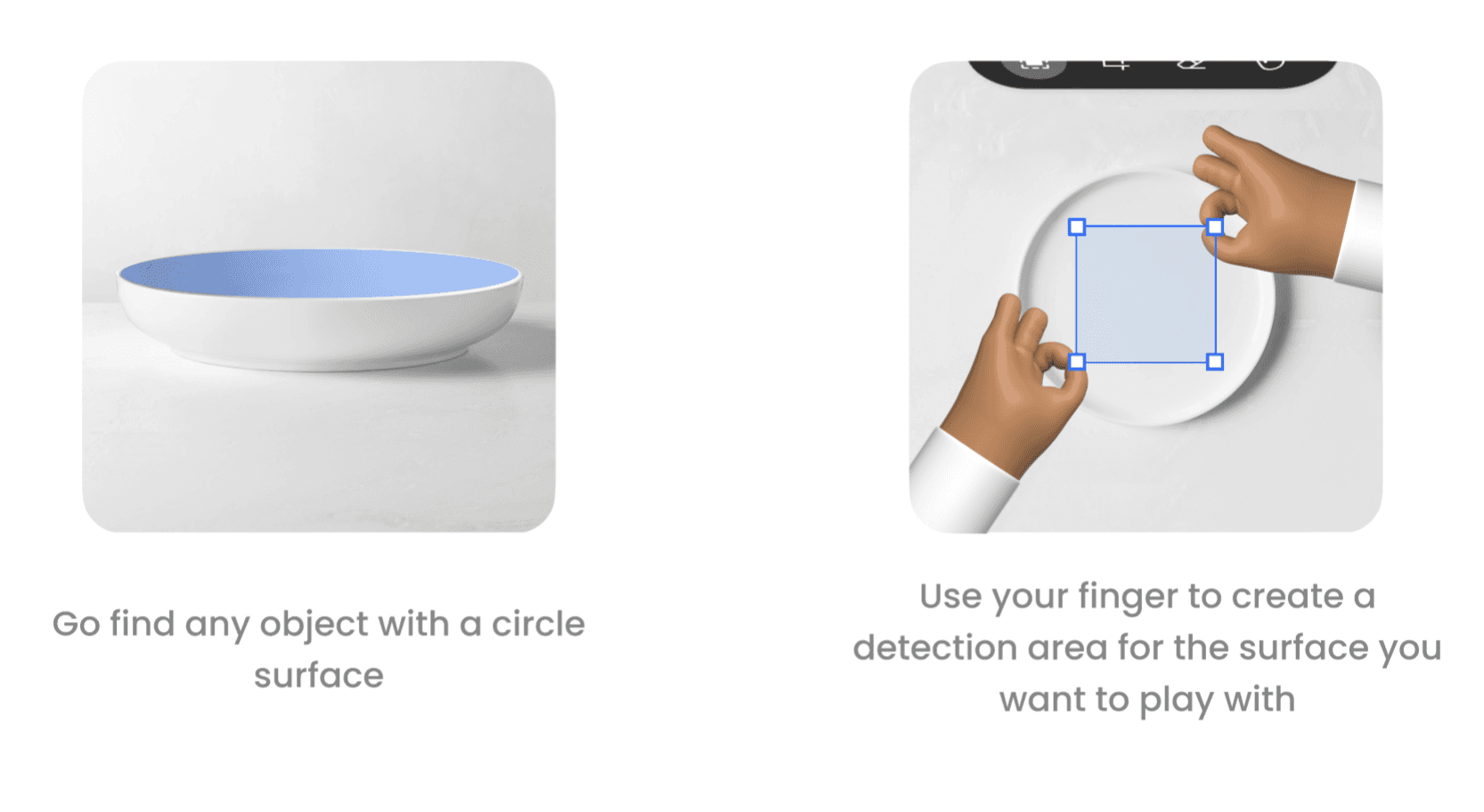

2
1
3
4
Interactive Exploration
MUSO encourages people to look at their surroundings with fresh eyes, discovering objects that can be transformed into musical magic. By scanning objects with gesture interface, MUSO can detect the shape and make this object as instrument based on the shape.
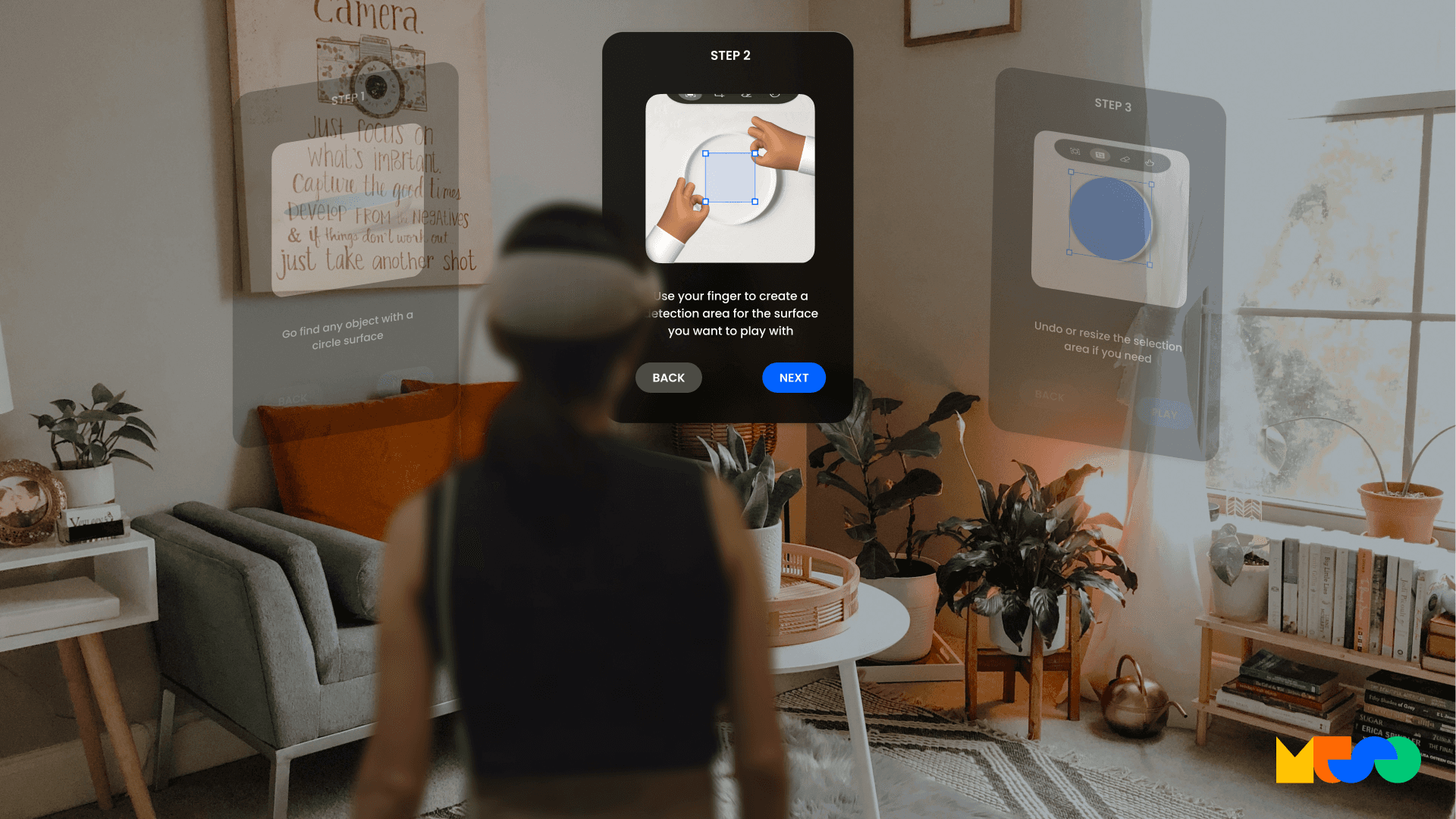
Unlock Creativity
MUSO's encourage kids to observe and experiment day life.
By recognize the shape, size of a object, MUSO can turn it into playful instrument.
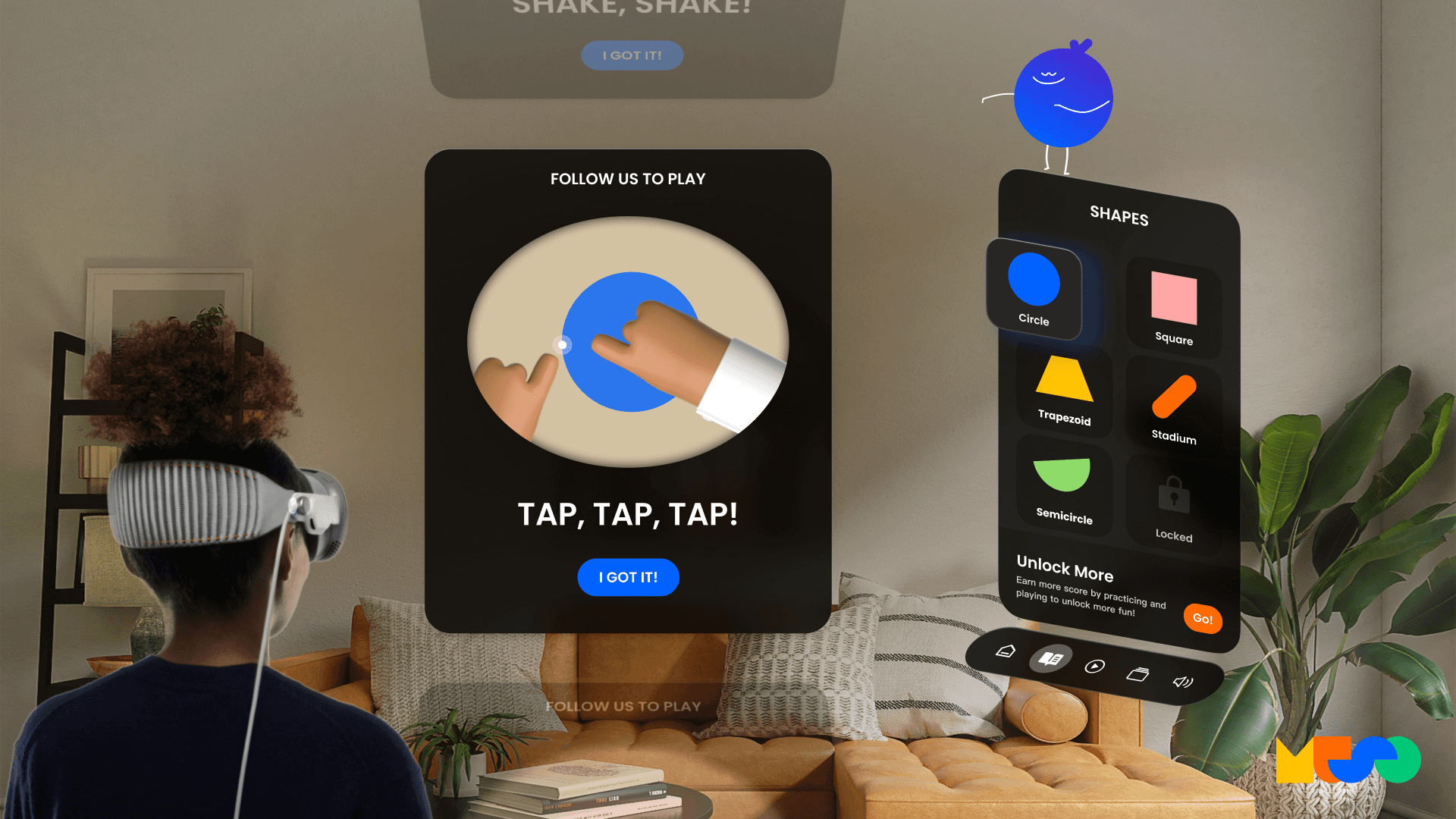
Music Theory Learning
As kids play and create music with MUSO, they simultaneously receive gentle guidance on music theory concepts. MUSO teaches them about rhythm, melody, harmony, and other fundamental principles, making the learning process engaging and fun.
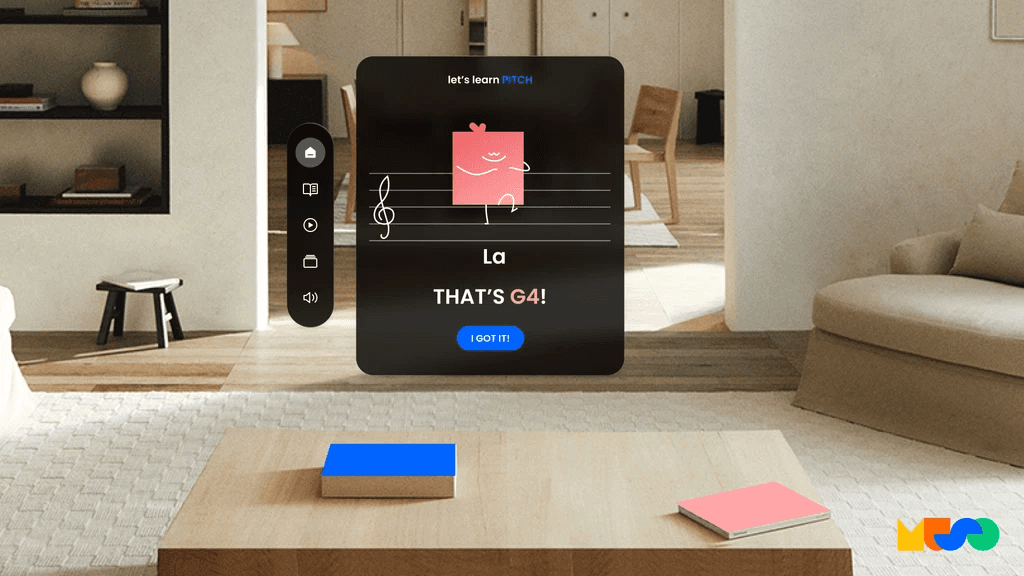
Intuitive Interaction
Through simple taps, clicks, or gentle rubs, users can bring their musical ideas to life.
Square shapes mimic percussion, circles represent melodies, and pill shapes emulate maracas, making music creation a delightful and intuitive process.
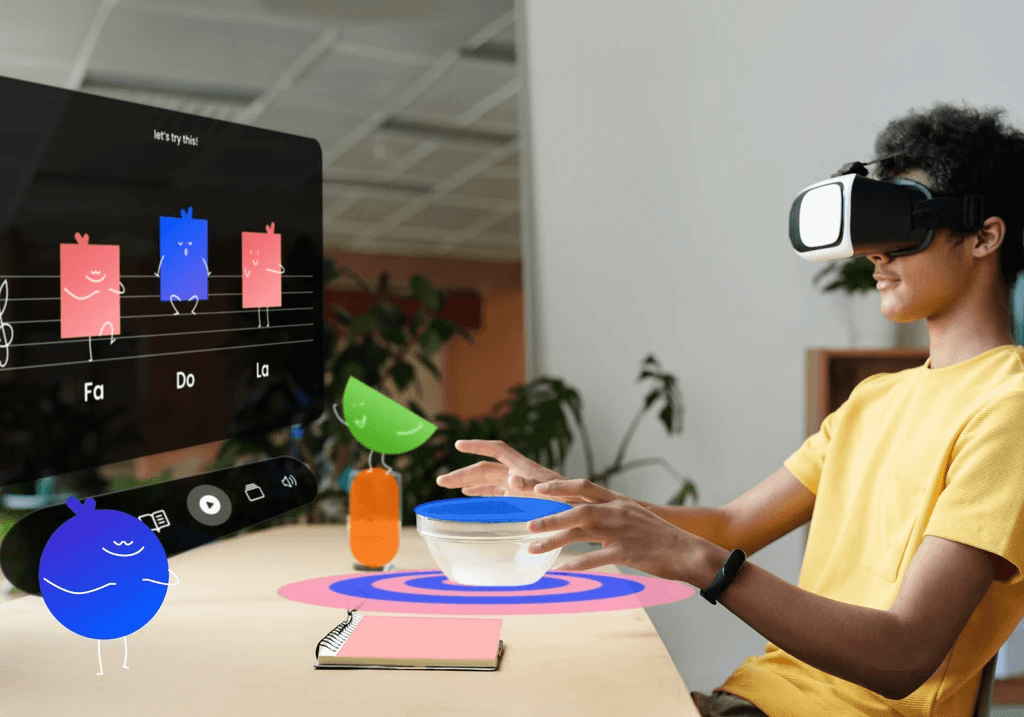
How to express visual effects?
We believe that visual effects add more variety and interest to the interaction between children and music. Therefore, we have incorporated unique visual effects for each musical interaction. Taking circular visual effects as an example: The program checks, during each play, whether the current hand movement speed, `currentSpeed`, is greater than or equal to 0.
If the hand is moving in the positive direction, the `MoveCount` counter is incremented by 1.
This allows the program to generate pink and blue circles sequentially based on the speed of the play.
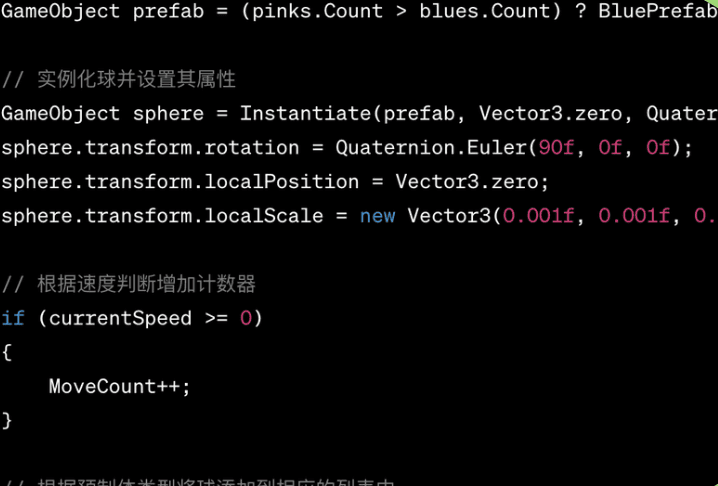
How to enable gesture recognition?
The first thing about music playing is to get rid of the controllers, because in reality we are not playing instruments with a controller. We embedded Oculus' gesture API to implement gesture control functionality.
Moreover, we tuned as many joints as possible for different triggers of the playing process to make the interaction more natural and smooth. Natural interaction has always been our main concern, we want to design a game for children with low learning costs.

The Core Idea
MUSO believes that music learning shouldn't be boring and inaccessible, by blending education with imagination and creativity, bridging the gap with affordable, engaging method. We aim to tackle <10% access to music education in the developing world.
MUSO believes that music learning shouldn't be boring and inaccessible, by blending education with imagination and creativity, bridging the gap with affordable, engaging method. We aim to tackle <10% access to music education in the developing world.
The Key Problem &
User Group
According to the statistics of 2022, the popularization rate of music education in developing countries is less than 10%. In China, for example, there is a general lack of music education for children due to factors such as the cost of music learning, the level of teachers, and the lack of widespread popularization and use of professional, effective, and fun children's music pedagogies for music initiation.What do Chinese young people think of when it comes to musical initiation? Learning to play the piano or the violin, which in turn conjures up images of children crying by the side of their instruments.
According to the statistics of 2022, the popularization rate of music education in developing countries is less than 10%. In China, for example, there is a general lack of music education for children due to factors such as the cost of music learning, the level of teachers, and the lack of widespread popularization and use of professional, effective, and fun children's music pedagogies for music initiation.What do Chinese young people think of when it comes to musical initiation? Learning to play the piano or the violin, which in turn conjures up images of children crying by the side of their instruments.
Click here for more information
Click here for more information
Then, what is MUSO?
Enhancing XR Experiences with Multisensory Feedback
User Testing is important for Improved Design
How it works?
MUSO is an XR music synthesizer that empowers kids to explore music by transforming surrounding everyday objects into magical instruments.
Teaching knowledge while kids play in XR.
MUSO is an XR music synthesizer that empowers kids to explore music by transforming surrounding everyday objects into magical instruments. Teaching knowledge while kids play in XR.
Muso
Muso is a XR creative music synthesizer that can turn daily objects into instruments in MR
MUSO is an XR music synthesizer that encourages children to turn ordinary everyday objects into fascinating musical instruments in XR. That feeling captures the essence of childhood wonder and the limitless potential of the imagination. MUSO offers users such a musical journey while introducing them to the basics of music theory. MUSO believes that music learning should be easy and fun, and hopes to bridge the gap in children's music education through a low-cost, entertaining approach.
DURATION: Jan 2023 - Apr 2023
MY CONTRIBUTION: UI Design, Interaction Design, XR Prototype, User Testing
OTHER CONTRIBUTOR: Monica Zhang, Zoe Zhang
TOOLS USED: Unity, Figma, Adobe Suits, Visual Studio Code, C Sharp
For more information 👇
About Project
RECOGNITION & AWARDS
RECOGNITION & AWARDS







XR design requires a multisensory feedback approach, encompassing graphics, sound, and haptics. Unlike traditional interactions, XR relies on these dimensions for immersion.
By providing multisensory feedback, we can enhance the user's sense of presence and connection within the virtual world, leading to a more holistic and enjoyable XR experience.
In the realm of XR design, the unique nature of individual mental models underscores the significance of user testing. To ensure clarity and user-friendliness, it is important to invite diverse participants for testing.
By accommodating distinct mental models through testing and feedback, we can refine interactions, enhancing the clarity and user-friendliness of the XR experience.
Takeaways




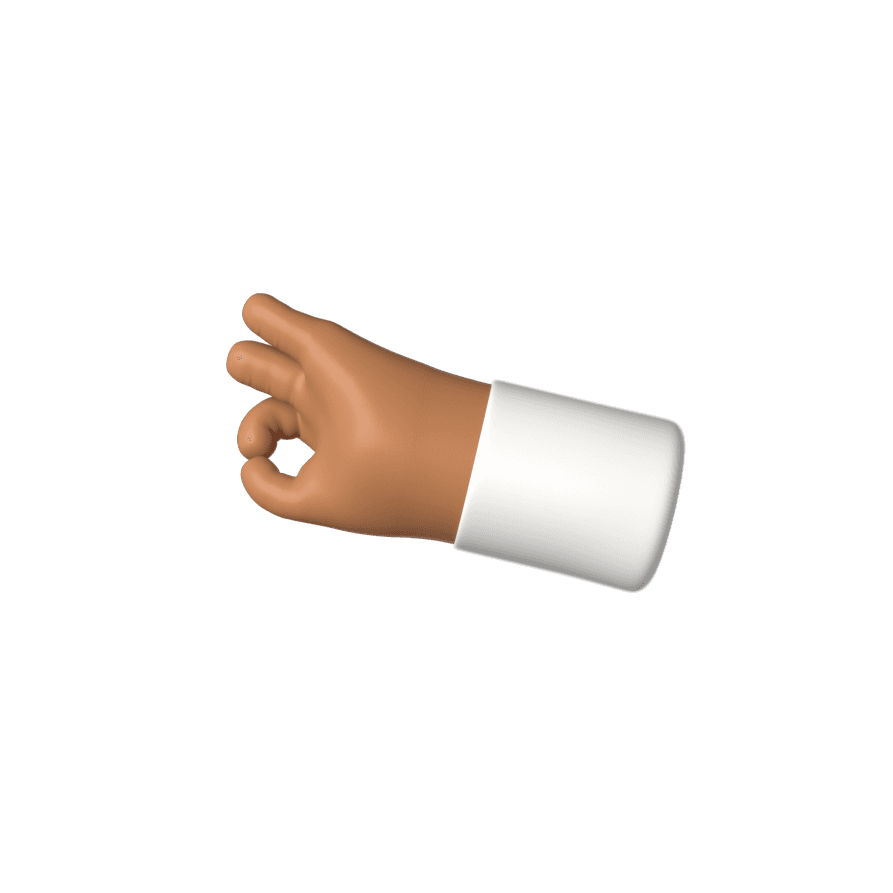

Use your finger to create a detection area for the surface you want to play with




Undo or resize the selection area
if you need
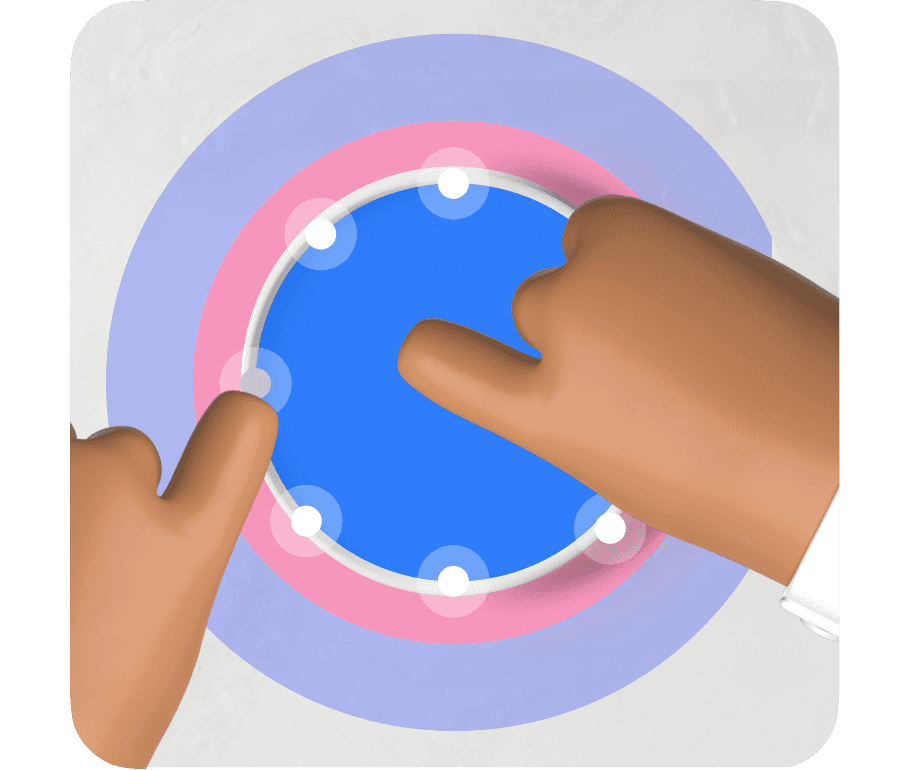
Tap to play! And learn music knowledge

Go find any object with a circle surface

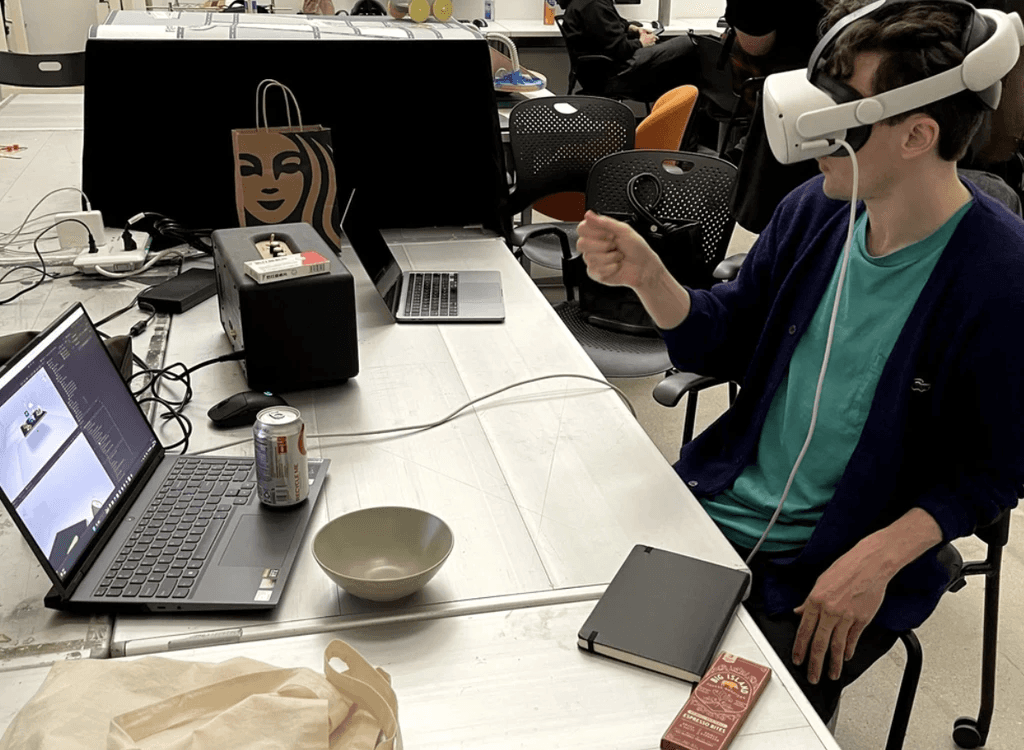
Development Challenges
Interactive Exploration
How to express visual effects?
Music Theory Learning
Unlock Creativity
How to enable gesture recognition?
Intuitive Interaction
Key features of MUSO
Key features of MUSO
MUSO encourages people to look at their surroundings with fresh eyes, discovering objects that can be transformed into musical magic. By scanning objects with gesture interface, MUSO can detect the shape and make this object as instrument based on the shape.
We believe that visual effects add more variety and interest to the interaction between children and music. Therefore, we have incorporated unique visual effects for each musical interaction. Taking circular visual effects as an example: The program checks, during each play, whether the current hand movement speed, `currentSpeed`, is greater than or equal to 0. If the hand is moving in the positive direction, the `MoveCount` counter is incremented by 1. This allows the program to generate pink and blue circles sequentially based on the speed of the play.
As kids play and create music with MUSO, they simultaneously receive gentle guidance on music theory concepts. MUSO teaches them about rhythm, melody, harmony, and other fundamental principles, making the learning process engaging and fun.
MUSO's encourage kids to observe and experiment day life. By recognize the shape, size of a object, MUSO can turn it into playful instrument.
The first thing about music playing is to get rid of the controllers, because in reality we are not playing instruments with a controller. We embedded Oculus' gesture API to implement gesture control functionality. Moreover, we tuned as many joints as possible for different triggers of the playing process to make the interaction more natural and smooth. Natural interaction has always been our main concern, we want to design a game for children with low learning costs.
Through simple taps, clicks, or gentle rubs, users can bring their musical ideas to life. Square shapes mimic percussion, circles represent melodies, and pill shapes emulate maracas, making music creation a delightful and intuitive process.










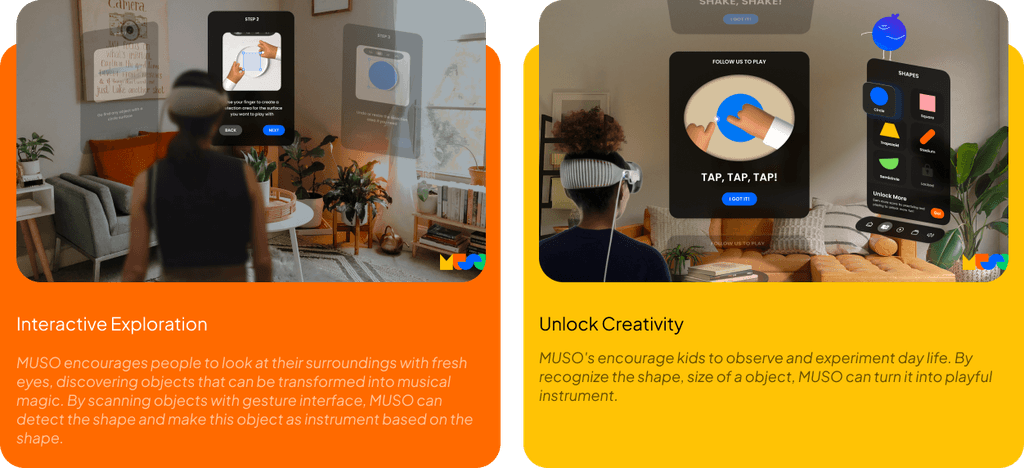





Development Challenges
